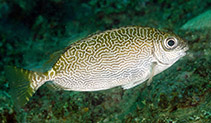| Family: |
Siganidae (Rabbitfishes) |
| Max. size: |
28 cm TL (male/unsexed) |
| Environment: |
reef-associated; marine; depth range 1 - 50 m |
| Distribution: |
Indo-West Pacific: Known from India to French Polynesia; north to Japan; south to New Caledonia. |
| Diagnosis: |
Dorsal spines (total): 13-13; Dorsal soft rays (total): 10-10; Anal spines: 7-7; Anal soft rays: 9-9; Vertebrae: 13-13. The species can adopt a number of camouflage patterns involving off-white, pale gray to blackish, and various shades of brown. The basic pattern consists of a labyrinth of narrow bands with upper half vermiculate, the lower ones tend to meander horizontally. This pattern extends to the fins. Iris golden dissected by a chocolate cross. 4-5 irregular off-white bars on caudal peduncle. Scales fine on cheeks, densely packed over lower 2/3 of preopercular region. Midline of thorax without scales between pelvic ridges. Fin spines stout, pungent, venomous. Preopercular angle 87-100 degrees. |
| Biology: |
Adults inhabit shallow coral reef flats. Found in rivers (Ref. 12792, 48637). Occurs in small schools (usually less than 10 individuals). Juveniles gather in larger numbers in corals with algae-grown at their bases (Ref. 48637). Initially, they browse on fine textured, e.g. filamentous algae, switching to coarser algae with increasing size. Both adults and juveniles are diurnal feeders (Ref. 4666). Fry are marketed fresh, pickled in brine or made into fish paste (Ref. 9813). Can inflict painful stings (Ref. 4690). |
| IUCN Red List Status: |
Least Concern (LC); Date assessed: 12 March 2015 Ref. (130435)
|
| Threat to humans: |
venomous |
Source and more info: www.fishbase.org. For personal, classroom, and other internal use only. Not for publication.

